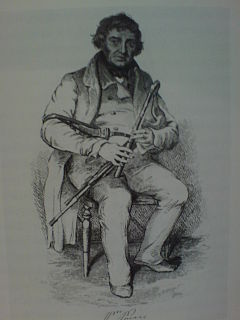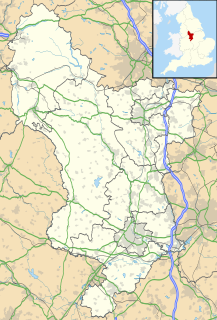Robert Nicholson (1798–1842) was a Northumbrian piper and fiddler. He was the nephew and pupil of William Green, who was piper to the Duke of Northumberland, and was later appointed as his assistant in this role.

The Northumbrian smallpipes are bellows-blown bagpipes from North East England, particularly Northumberland and Tyne and Wear. In a survey of the bagpipes in the Pitt Rivers Museum, Oxford University, the organologist Anthony Baines wrote: "It is perhaps the most civilized of the bagpipes, making no attempt to go farther than the traditional bagpipe music of melody over drone, but refining this music to the last degree."
William Green (1775–1860) was a player of the Northumbrian smallpipes, and the Piper to the Duchess of Northumberland from 1806 until 1849. He was assisted in this role by his nephew Robert Nicholson (1798–1842), and his son William Thomas (Tom) Green (1823–1898). Tom then succeeded his father as Ducal Piper until 1892. Father, nephew and son thus held some of the most influential piping roles in the county for a period of almost ninety years.

Duke of Northumberland is a noble title that has been created three times in English and British history, twice in the Peerage of England and once in the Peerage of Great Britain. The current holder of this title is Ralph Percy, 12th Duke of Northumberland.
He first played in public together with his uncle, for instance at a meeting of the Society for the Improvement of the English Marygold, in 1816. [1] However, he was already performing alone at this time; a newspaper article [2] states that the Duchess's Piper being prevented from playing there by illness, his young nephew Robert Nicholson, then 18, "just the age of the late famed Wm Lamshaw, when he bore away the prize at a musical match at Elsdon Court Baron" , deputised for him, playing for the first time unassisted. It is clear from this that Green would normally have been expected to play at this event. Again, the following year, at a celebration of Earl Percy's wedding, in North Shields, Nicholson deputised for Green, who said he was unable to attend the event at short notice. [3] It may well be that Green was deliberately excusing himself from these events, so that his nephew would get opportunities to perform in his own right. He played again in an official capacity that December, at a celebration of the birthday of Lord Prudhoe, [4] in this account he is referred to as assisting "the Duchess's pipers", and called "the Percy piper", suggesting some measure of official recognition from the Duke. He played again for the Society for the Improvement of the English Marygold on various occasions until 1823, together with Green. An account of their playing for the Society in 1822, stated that "Fitzmaurice, Allen, Lamshaw, or Hair, never performed better"; it also refers to the "present improved form" of the pipes - in 1822 this would probably refer to the keyed instruments developed by Robert Reid. It also confirms that "the revival of northern music... constitutes one of the most prominent objects of the Society." [5] In 1824, at the Tynemouth Fair in May, "many gentlemen dined at the Northumberland Arms, and were delighted with the ancient music of the Duchess of Northumberland's pipers" - these would have been Green and Nicholson. [6] In William Green's obituary, particular mention is made of their innovative duet playing, with one playing the air, and the other playing the accompaniment. Previously, the instrument was primarily a solo instrument - harmonies would not have been feasible when the instrument's range was only a single octave, which was the case until the beginning of the 19th century.
'Young' William Lamshaw (1780–1806) was a player of the Northumbrian Smallpipes. Despite his early death, he was a significant figure in the history of the instrument, being appointed Piper to the Duchess of Northumberland at an early age, after the death of his grandfather Old William Lamshaw. He was active at a time when keys were being added to the instrument, and one of the most prominent early players of the improved instrument. Living in North Shields, it is very likely that he would have known Robert Reid, who had settled in the town in about 1802.
Thomas Hair (1779–1854) was a violinist and player of the Northumbrian smallpipes, who lived in Bedlington. This town, and the surrounding district of Bedlingtonshire, were until 1844 a detached part of County Durham, but were then made part of Northumberland.
Robert Reid (1784–1837) is widely acknowledged as the creator of the modern form of the Northumbrian Smallpipes. He lived and worked at first in Newcastle upon Tyne, but moved later to the nearby town of North Shields at the mouth of the Tyne, probably in 1802. North Shields was a busy port at this time. The Reids were a family with a long-standing connection to piping; Robert's father Robert Reed (sic), a cabinet maker, had been a player of the Northumbrian big-pipes, and an associate of James Allan, his son Robert was described later by James Fenwick as a beautiful player as well as maker of smallpipes, while Robert's son James (1814–1874) joined his father in the business. Robert died in North Shields on the 13th or 14th of January 1837, and his death notice in the Newcastle Journal referred to him as a "piper, and as a maker of such instruments is known from the peer to the peasant, for the quality of their tone, and elegance of finish". He is buried in the graveyard of Christ Church, North Shields. His wife Isabella died in 1849, of cholera. There were repeated outbreaks of the disease at this time especially in the poor 'low town', near the river, where the Reids lived.
Sources for his later life are much scarcer. He was a witness at William Green's marriage in Alnwick, in 1825. The Duchess's pipers, that is William Green and Robert Nicholson, played at Ovingham Fair in 1826. There seems to be no later dateable reference to him as a piper performing in public. Green was witness at Nicholson's marriage to Margaret Dodds, in St. Nicholas' Church, Newcastle, in 1831.
Nicholson died in Morpeth, on 11 October 1842, in the Black Swan, in King Street (now called Back Riggs), "unrivalled as a musician on the Northumberland small pipes, and was one of the Duchess of Northumberland's late pipers." [7] In the 1851 census, Margaret Nicholson, a widow, is listed as innkeeper of the Black Swan. As all her children were born before 1842, the identification of her as Robert's widow is very likely. Two years after Nicholson's death, Thomas Chisholm was appointed as piper to the Duke of Northumberland for the Manor of Tynemouth, as his successor in the role. [8] He performed at several local events in this capacity until 1848, but moved to Newcastle shortly after this.


